Last Updated on: February 4, 2025
Being a bird enthusiast in Georgia is exciting, as this state has over 400 bird species. Six on this list have a resident population you can see every time you go birding, while other raptors are summer visitors.
Therefore…
As we discuss hawks in Georgia, we’ll mention the ones you’ll see, their diet, and their unique nesting habits.
Georgia Hawks Behavior, Habitats & Plumage Details
You might have to visit a park to see a hawk in Georgia, as most of them aren’t backyard visitors and the ones that show up have predatory habits that’ll chase away blue jays and other small birds. Here’s a list.
1. Red-tailed Hawk
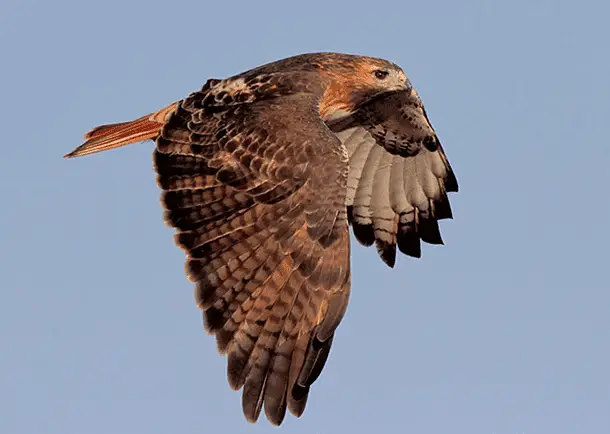
Red-tailed hawks (Buteo jamaicensis) aren’t the largest hawks in Georgia, but they’re about the size of a fish hawk. You’ll see these birds in Georgia any day of the year.
A red-tailed hawk has the same features as other hawks in the buteo genus, and it’s among the largest in this genus. It has a short cinnamon-red tail and rounded wings.
The light brown morph birds have a reddish-brown breast and an underbelly with dark brown feathers like rough-legged hawks, while the dark morph avians have a rich brown chest. This red-tailed hawk prefers to nest on cliff ledges or the peaks of tall trees.
Most red-tailed hawks eat small mammals and birds. They may hunt ground squirrels, voles, rabbits, and mice in forests and still come to backyards looking for small birds about the size of starlings.
2. Red-shouldered Hawk
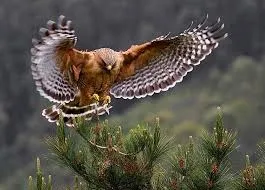
A red-shouldered hawk prefers forests and flooded swamps. Do you have such habitats near you?
Red-shouldered hawks are medium-sized birds with a stunning checked pattern on their backs.
These raptors are defensive, sometimes fighting larger birds like great horned owls. They have reddish-brown breasts and white bands that make their black tails distinctive.
They’re colorful raptors though their name suggests their most unique feature is their red shoulders only. The young hawks have white underbellies with brown streaks. Fortunately, red-shouldered hawks are resident birds, so you’ll see them preying on small rodents in forests near swamps or rivers.
They spend breeding seasons in the northern U.S. area and winter south, around Texas and Mexico.
You’re likely to see a red-shouldered hawk on Jekyll Island. If you spot nests, go back a year later, and find the same breeding pairs.
3. Sharp-shinned Hawk
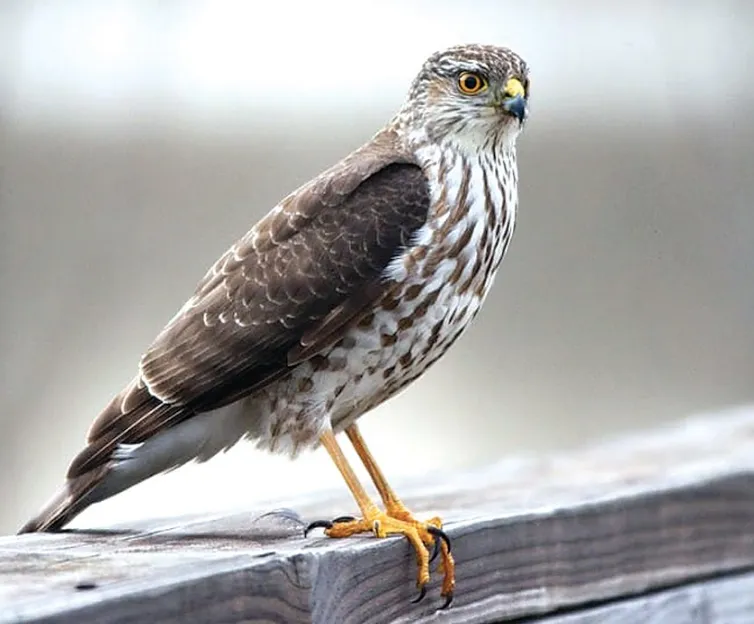
A sharp-shinned hawk is a smaller hawk between 9.4 and 13.4 inches long. Georgia hawk sounds can help you distinguish between this raptor and Cooper’s hawk. A sharp-shinned hawk call is a Kik-Kik-Kik, while Cooper’s hawks make a Cak-Cak-Cak.
You’ll tell this raptor by its blue-gray back and red-orange streaks on its chest. Adults have dark bands on their long tails.
Even better, sharp-shinned hawks love bird feeders because it is easier to get their favorite food there. You’ll see them lurking, waiting for songbirds like mourning doves as they glide and flap their wings continuously.
These sharp-shinned hawks live on forest edges and breed in dense forests. Georgia is in the wintering range of this species, so you’ll see it after the breeding season in Canada and the northern U.S. You may see these migratory birds in Okefenokee National Wildlife Refuge and Piedmont National Wildlife Refuge.
Fortunately, there’s a resident population, but you have to go birding close to the northern edge of Georgia.
4. Broad-winged Hawk

Broad-winged hawks aren’t common hawks in North America since most of the eastern states are in the breeding range. Therefore, they live in Georgia in summer and fly to Central and South America in winter.
You might have to search a bit longer than usual to see these Georgia hawks as they are elusive. They rarely show up in urban areas. However, they migrate in the fall in large flocks called kettles.
Broad-winged hawks are easy to ID because, unlike most hawks in Georgia with black wings, they have broad wings with brown feathers. On top of that, broad-winged hawks have reddish-brown heads and barred underbellies. But, there is also a rare dark morph with dark brown plumage and a tail with a white band.
The first thing you’ll notice when a broad-winged hawk is its strongly banded tail.
You’re more likely to spot it in a deciduous or mixed forest, though it changes habitats with the season.
For instance, the migrating birds of prey prefer tropical forest edges and topical scrublands. On the other hand, the breeding pairs of the broad-winged hawk species nest in wet forests hunting small mammals, insects, reptiles, and birds. Young turtles also make a good meal.
5. Northern Harrier
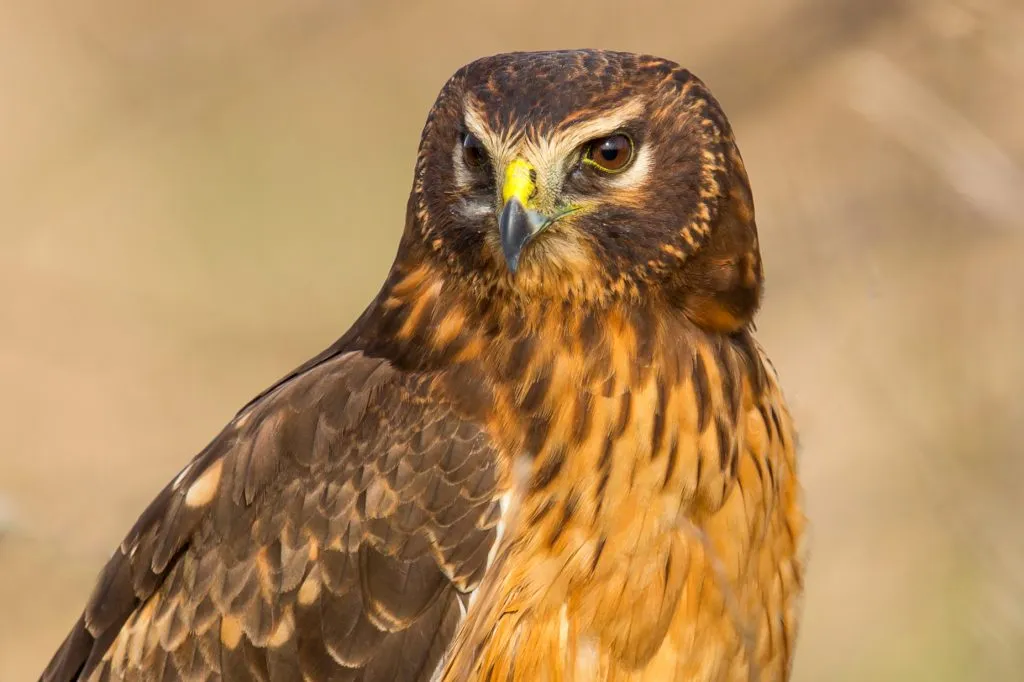
Northern harriers rely on sound and vision when hunting, and they resemble owls because of their disc-shaped faces. A male northern harrier has pale grey feathers above and small brown patches on its white belly when soaring in the sky.
A female’s underbelly has pale feathers with brown streaks. It also has the same broad wings and white rump patch as a male. Juveniles have a lighter shade as they have cinnamon underparts and darker brown heads. They also have bands on their tails and flight feathers.
Northern harriers aren’t as large as red-tailed hawks since their body length measures 18.1 to 19.7 inches.
Further, this Georgia hawk eats small mammals and other birds, but you might see it preying on larger species like ducks.
6. Cooper’s Hawk
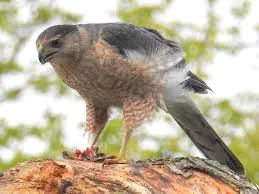
This Georgia hawk breeds in the northern states and winters in southern states and Mexico.
It loves dense forests where it can chase smaller birds through the canopy. You’ll also find Cooper’s hawks on forest edges.
This hawk species resembles the sharp-shinned hawk. You can compare the two by their size, as Cooper’s hawks are six inches larger.
If they aren’t close enough to compare their sizes, see if you can ID Cooper’s hawk using the following features. It’s steely blue-gray above with reddish barring on its underside, red eyes, a banded tail, and a black cap.
Watch This!
Frequently Asked Questions
Are goshawks in Georgia?
No, just like the rough-legged hawk, there are no northern goshawks in GA. Their resident population is in the northern area of the U.S., and wintering grounds are in the central states.
How do I identify a hawk?
Plumage distinguishes various types of hawks better than size when you’re watching them from a distance. The easiest way to use plumage as an ID detail is by comparing what you see with the pictures in your birding journal. A bird’s name can also guide you sometimes. For instance, the red-tailed hawk has an unmistakable red tail.
If you’re looking at Georgia birds in your backyard, you can compare their bill-to-tail length or wingspan. Other factors are wing shape, motion, bill length, tail length, and eye color.
Are Cooper’s raptors in Georgia?
Yes, they are since there’s a resident population in most of the U.S. except the south of Florida, Alabama, and Texas, among others that host this species in winter. The breeding range is in the northern states like Montana, Idaho, and Washington.
Are hawks protected in Georgia?
Yes, the Migratory Bird Treaty Act protects them, so you need a special permit to shoot or kill these birds of prey.
Conclusion
Hawks native to this state are minimal as Georgia is on the migratory route of birds heading south. The hawk species in our list hunt small mammals, but some, such as the sharp-shinned, also eat smaller birds. Therefore, if your backyard has small rodents or bird feeders that attract blue jays and starlings, you might see all the hawks of Georgia at your doorstep.

